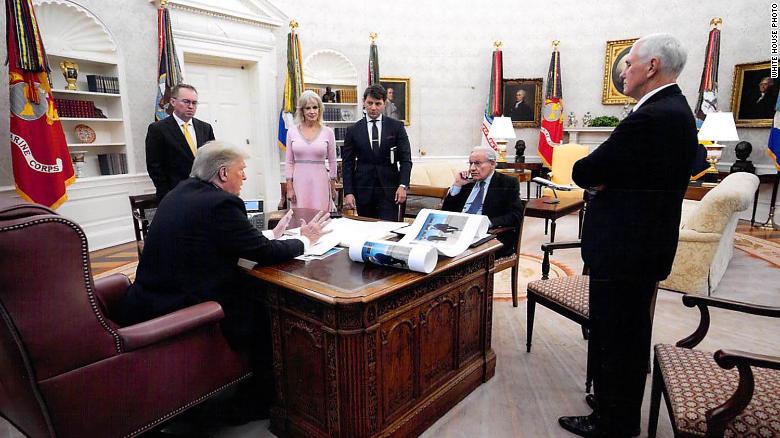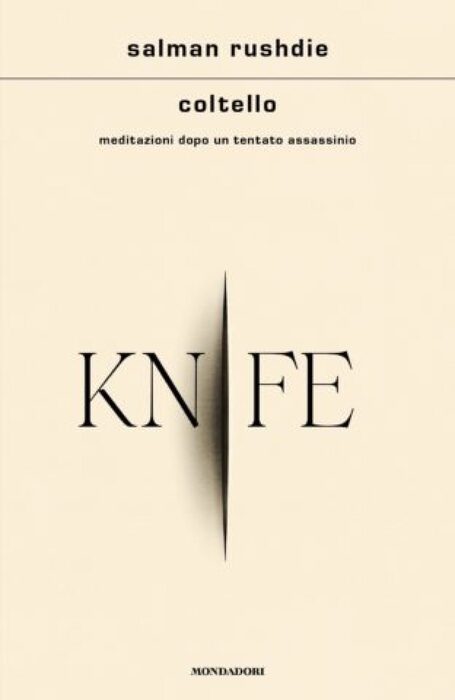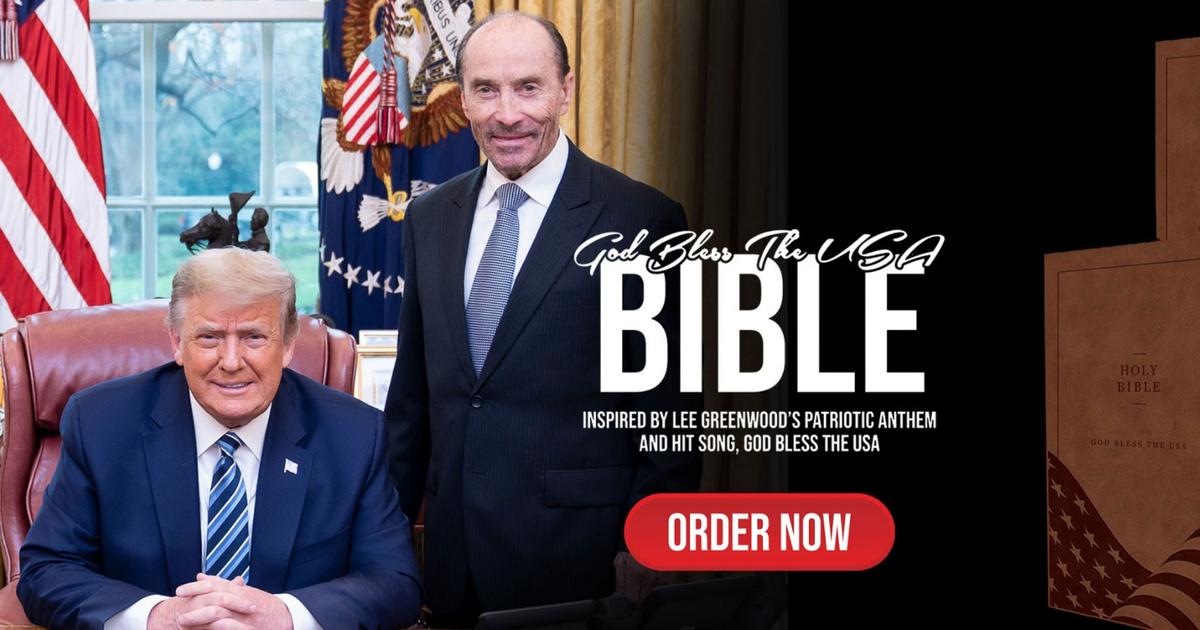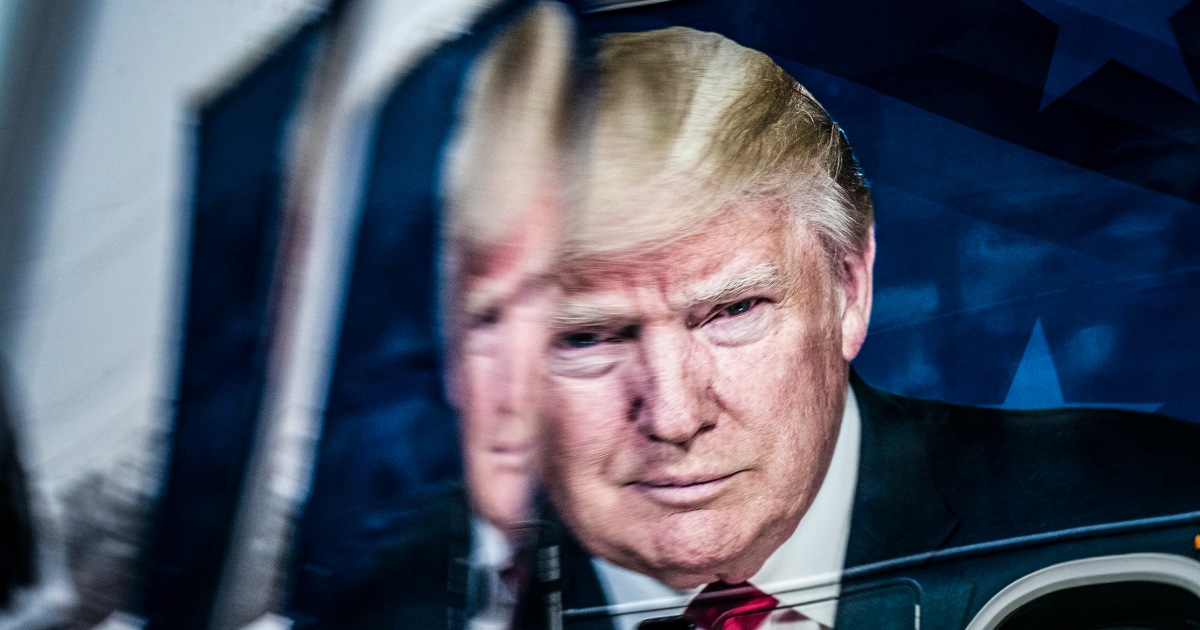(CNN) -
US President Donald Trump admitted that he knew weeks before the country's first confirmed coronavirus death that the virus was dangerous, that it was airborne, that it was highly contagious, that it was "Deadlier than even a very bad flu" and that he repeatedly downplayed it publicly, according to journalist Bob Woodward in his new book "Rage."
"This is deadly," Trump told Woodward on February 7.
In a series of interviews with Woodward, Trump implied that he knew in detail the threat of the virus before he thought.
"It's quite surprising," Trump told Woodward, adding that the coronavirus was perhaps five times "more deadly" than the flu.
Trump Lies By Accusing Military Of Favoring Private Businesses, Says Retired US Colonel
Trump's remarks contrast with his frequent public comments at the time, when he insisted that the virus "was going to go away" and that "everything would be fine."
The book, which includes Trump's testimony, shows a president who has betrayed the public trust and the most fundamental responsibilities of his office.
In "Rage," Trump asserts that a president's job is to "keep our country safe."
But in early February, he told Woodward that he knew how deadly the virus was, and in March he admitted that he kept that knowledge hidden from the public.
"I always wanted to downplay it," Trump told Woodward on March 19, even though days earlier he had declared a national emergency over the virus.
"I still like to minimize it, because I don't want to create panic," he said then.
Experts believe that thousands of American lives could have been saved if Trump had acted decisively in early February, ordering a strict lockdown, with a message that insisted on wearing face masks, maintaining physical distancing and washing hands.
The surprising revelations of "Rage," which CNN obtained before its release on September 15, are contained in 18 extensive interviews that Trump gave Woodward between December 5, 2019 and July 21, 2020. The conversations were recorded by Woodward with Trump's permission and CNN has obtained copies of some of the audio tapes.
"Rage" also includes brutal evaluations of Trump's presidency by many of his former senior national security officials, including former Defense Secretary James Mattis, former Director of National Intelligence Dan Coats, and former Secretary of State. State, Rex Tillerson.
Mattis is quoted as saying that Trump is "dangerous" and "inappropriate" to be commander in chief.
Woodward writes that Coats "continued to harbor the secret belief - one that had grown rather than diminished, albeit unsupported by intelligence evidence - that Putin had something on Trump."
Woodward goes on to write what Coats felt: “How else can the president's behavior be explained?
Coats saw no other explanation.
In this December 2019 White House photo provided by Bob Woodward, President Donald Trump is seen speaking with Woodward in the Oval Office, surrounded by some aides and advisers, as well as Vice President Mike Pence.
On Trump's desk is a large image of Trump and North Korean leader Kim Jong Un.
The book also contains stark evaluations of the president's leadership by current officials in managing the crisis caused by the new coronavirus.
Dr. Anthony Fauci, the government's leading infectious disease expert, is quoted in the text as telling others that Trump's leadership is "aimless" and that his attention span "is like a negative number."
"His sole purpose is to be re-elected," Fauci told a contributor, according to Woodward.
"The virus has nothing to do with me"
Woodward reveals new details about the early warnings Trump received and often ignored.
On January 28, in a highly confidential intelligence report, National Security Advisor Robert O'Brien issued a "shocking" warning.
He told President Trump that it would be the "greatest threat to national security" of his presidency.
Trump's head "reared up," Woodward writes.
O'Brien's deputy aide Matt Pottinger agreed, telling the president that it could be as serious as the 1918 influenza pandemic, which killed an estimated 50 million people worldwide, including 675,000 Americans.
Pottinger noted that there was an asymptomatic spread taking place in China: he had been told that 50% of those infected showed no symptoms.
At that time, fewer than a dozen cases of coronavirus had been reported in the US.
Three days later, Trump announced restrictions on travel from China, a move suggested by his national security team, despite subsequent claims by the president that only he had endorsed that guideline.
Yet Trump continued to publicly downplay the danger of the virus.
February was a lost month.
Woodward sees this as a critical missed opportunity for Trump to reset "the leadership clock" after he was told it was a "once-in-a-lifetime health emergency."
«The presidents are the Executive Power.
There was a duty to warn.
Listen, plan and care, ”Woodward writes.
But in the days after the Jan. 28 briefing, Trump played down the threat in his appearances and, as Woodward writes, "to assure the public that they faced less risk."
During a pre-Super Bowl interview on Fox News on February 2, Trump said, "We practically blocked it when it came from China."
Two days later, during his State of the Union address, Trump made only a passing reference to the virus, vowing: "My administration will take all necessary steps to protect our citizens from this threat."
When asked by Woodward in May if he remembered O'Brien's January 28 warning, which then said the virus would be the greatest threat to national security of his presidency, Trump was ambiguous.
"No, I don't remember."
I'm sure if he said it… I'm sure he said it.
He's a good guy.
The book highlights how the president took all credit and no responsibility for his actions related to the pandemic, which has infected more than 6.3 million Americans and killed more than 190,000 in the country.
"The virus has nothing to do with me," Trump told Woodward in his final interview in July.
"It's not my fault ... China let out the damn virus."
Trump Lies By Saying He Was Being "Sarcastic" When He Talked About Injecting Disinfectant
"Travel through the air"
When Woodward spoke to Trump on February 7, two days after the Senate acquitted him in impeachment, the veteran journalist expected a lengthy conversation about the trial.
However, he was surprised by the president's focus on the virus.
At the same time that Trump and his public health officials called the virus "low risk," Trump revealed to Woodward that the night before he had spoken with Chinese President Xi Jinping about the virus.
Woodward quotes Trump as saying, "We have a bit of an interesting setback with the virus in China."
"It travels through the air," Trump said.
That is always more difficult than touch.
You don't have to touch things, right?
But the air, you just breathe the air and that's how it happens.
And that is very complicated.
It is very delicate.
It is also more deadly than even a strong flu.
But Trump spent most of the next month saying that the virus was "totally under control," and that the cases in the US would "go away."
Trump said on his trip to India on February 25 that COVID-19 was "a problem that is going to disappear," and the next day he predicted that the number of infections in the US "within a couple of days will decrease. to almost zero.
On March 19, when Trump told Woodward that he was deliberately downplaying the dangers to avoid creating panic, he also acknowledged the threat to youth.
“Only today and yesterday, some surprising facts emerged.
It's not just about the elderly, the elderly.
Also young, many young people.
Yet Trump has continued to publicly insist on the opposite.
Only on August 5 did he say that children were "almost immune" to the disease.
Even in April, when the United States became the country with the most confirmed cases in the world, the president's public statements contradicted what he had told Woodward.
At a coronavirus task force briefing on April 3, Trump was still downplaying the virus and claiming it would go away.
"I said he's leaving and he's leaving," he said.
However, two days later, on April 5, Trump again told Woodward: “This is horrible.
Is incredible".
And on April 13 he said, "It's so easily transmissible you wouldn't even believe it."
"Dangerous" and "inappropriate"
Woodward, a two-time Pulitzer Prize winner, conducted hundreds of hours of confidential interviews with first-hand witnesses for the book "Rage" and obtained "confidential notes, emails, diaries, calendars, and documents," including more than two dozen letters. that Trump exchanged with North Korean leader Kim Jong Un.
Woodward is known to record his interviews with the permission of his subjects and sources.
He writes that when he attributes exact quotes, thoughts, or conclusions, that information comes from the person, a colleague with direct knowledge, or documents.
Trump's conscious minimization of the coronavirus is one of many revelations in "Rage."
The book is full of anecdotes about senior cabinet officials caught off guard by the tweets, frustrated by Trump's inability to focus, and fearful that his next policy directive is due to his refusal to accept facts or listen to experts.
Mattis is quoted as saying that Trump is "dangerous," "unfit," that he "has no moral compass" and made foreign policy decisions that showed adversaries "how to destroy America."
After Mattis left the administration, he and Coats considered testifying publicly against Trump.
Mattis says he finally gave up on the idea after Trump announced the withdrawal of US troops from Syria, "when they basically ordered me to do something that I thought went beyond stupid to a serious crime."
Woodward writes that Coats and the most senior members of his staff "examined the intelligence information as carefully as possible," and that Coats still criticizes the relationship between Trump and Russian President Vladimir Putin.
“Coats saw how extraordinary it was for the president's top intelligence official to harbor such deep suspicions about the president's relationship with Putin.
But he couldn't get rid of them.
Trump has come under fire in recent days for allegedly making disparaging comments about US military personnel and veterans. Woodward's book includes an anecdote in which a Mattis adviser overheard Trump say at a meeting: "My damn Generals are a bunch of cowards, 'because they cared more about alliances than trade agreements.
Mattis asked the advisor to document the comment in an email.
And Trump himself criticized the military officers in front of Woodward for their opinion that alliances with NATO and South Korea are the best deal the US makes. "I would not say they are stupid, because I would never say that about our military. Trump said.
But if they said that… whoever said that was stupid.
It's a horrible deal… they make so much money.
They cost us $ 10 billion.
We are fools.
Woodward reports that Trump's national security team was concerned about the near possibility of a nuclear war with North Korea amid provocations in 2017. "We never knew if it was real," Secretary of State Mike Pompeo said, quoted in the book, "or if it was a hoax."
But it was so serious that Mattis slept dressed to be ready in case there was an attack and repeatedly went to the Washington National Cathedral to pray.
Trump bragged to Woodward of a new secret weapons system.
"I have built a nuclear system, a weapons system that nobody has had before in this country," he said.
Woodward says other sources confirmed the information, without providing further details, but expressed surprise that Trump released it.
Woodward obtained the 27 "love letters" that Trump exchanged with Kim Jong Un, 25 of which have not been publicly reported.
The letters, full of flowery language, provide a fascinating window into their relationship.
Kim compliments Trump by repeatedly calling him "Your Excellency," and writes in a letter that meeting again would be "reminiscent of a scene from a fantasy movie."
In another letter, Kim writes: "The deep and special friendship between us will function as a magical force."
CNN has obtained the transcripts of two of the letters.
Trump's son-in-law and senior White House adviser Jared Kushner also chimes in with some unusual literary ideas about his father-in-law.
Kushner is quoted as saying that four texts are key to understanding Trump, including "Alice in Wonderland."
Kushner paraphrased the Cheshire cat: "If you don't know where you are going, any road will take you there."
Woodward asked Trump about the role of Saudi Crown Prince Mohammed bin Salman in the murder of journalist Jamal Khashoggi in 2018. Once again, Trump dismissed the US intelligence assessment and defends Bin Salman: "He says very strongly that he is not. did".
Trump insulted his predecessors by saying that Woodward made former President George W. Bush "look like a stupid idiot, which he was."
Trump said of former President Barack Obama: “I don't think Obama is smart… I think he's very overrated.
And I don't think he's a great speaker.
He also tells Woodward that Kim Jong Un thought Obama was an "idiot."
Woodward spoke about the Black Lives Matter protests and suggested to the president that people like the two of them, "white, privileged," should work to understand the anger and pain felt by blacks in America. "You really believed the story, no?
Just listen to him, ”Trump responded, repeating his outrageous argument that he has done more for the black community than any president other than Abraham Lincoln.
Woodward reports new details about Russia's meddling in the elections and writes that the US National Security Agency and the CIA possess classified information claiming that the Russians had placed malware in the voter registration systems of at least two counties. from Florida, St. Lucie and Washington.
While there was no evidence that the malware had been activated, Woodward writes, it was sophisticated and could wipe voters in specific districts.
The voting system provider used by Florida was also used in states across the country.
Dynamite behind the door
"Rage" is a follow-up to Woodward's best-selling 2018 book, "Fear," which portrayed a chaotic White House in which his advisers hid Trump papers to protect the country from what they saw as his most dangerous impulses.
Trump harshly criticized "Fear," and also complained that he did not speak to Woodward for the book, resulting in him accepting lengthy interviews for "Rage."
Yet on August 14, Trump pre-emptively attacked Woodward's new book by tweeting: "Bob Woodward's book will be bogus, as always, as will many of the others."
Throughout the text, Trump offers insight into his vision for the presidency.
He tells Woodward that when someone runs a country "there is dynamite behind every door."
After his 18 interviews, Woodward delivers a harsh verdict: Trump is the "dynamite behind the door."
Woodward concludes his book with a statement that "Trump is the wrong man for the presidency."
White Housecovid-19Pandemic









